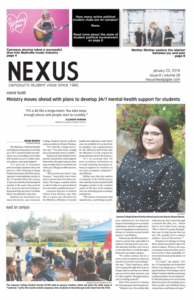North America’s first attempt at environmental reform was an earnest one. It can be traced back to the early 1970s and the formation of the Environmental Protection Agency (EPA) in the United States. The EPA was formed as a response to widespread pollution caused by the previous century’s industrial boom. Unfortunately, almost 50 years later, instead of being cured, the damage to our planet is spreading to every corner like a violent cancer.
My proposed treatment? Bike lanes.
Bike lanes are a contentious issue, especially in Victoria. Here, bike lanes have been so hotly debated and the issue rehashed so many times that it’s practically old news. But there are larger issues at play in our society than a few inconvenient bike lanes.
Within sociological theory, there exists a socio-psychological phenomenon called “diffusion of responsibility.” This theory states that people are less likely to take action on a problem when many other people are present. The larger the crowd, the more diffusion of responsibility is experienced. When humans see evidence of dangerous wrongdoing, many of us are inclined to do nothing if we think someone else will take responsibility.
As a result of this diffusion of responsibility, we get to remain in comfort while we convince ourselves that someone else will cure the fast-killing cancer infecting our planet.
Comfort, it appears, is a greater motivator than impending doom.
The number of people who drive in Canada is higher than I thought. According to Statistics Canada, for 36.71 million people, there were 34.32 million vehicles registered in Canada in 2017. Even if multiple vehicles are registered in the same name, that’s still a lot of vehicles out there; most of them probably use combustible gas engines,one of the main sources of pollution that the public has the ability to stop using.
So, what does this have to do with bike lanes?
Even though many people drive out of necessity, there are also many people who drive out of laziness. Carbon emissions are one of the main sources of climate change, and despite the fact that there are definitive ways to decrease emissions—such as driving less—many people simply do not take advantage of them.
Once again, comfort shows its ability to motivate.
Some say we should simply assess people’s driving needs and restrict access to licenced vehicles to reduce driver count. I’m not a fan of the dubious ethics that kind of thinking represents. But to discourage driving and encourage biking through the creation of bike lanes provides an alternative that creates freedom instead of limiting it.
People who want to bike for the health of the planet are given incentive due to the convenience of travel, not to mention the increased safety that bike lanes provide. And, if more people start biking, or even taking the bus, it means fewer cars on the road and more freedom of travel for those who are required to drive.
Even though bike lanes aren’t a cure-all, if enough people use them we will put a considerable dent in the Earth’s disease. We might be a bit uncomfortable for a few years while we adjust to these new methods of treatment, but these methods help us create hope.
Our planet can be brought back to health, but it starts with us.

